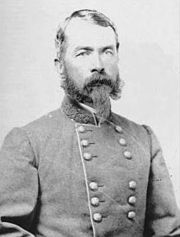 |
| General Sam Jones |
HEADQUARTERS DEPARTMENT OF WESTERN VIRGINIA, Dublin Depot, January 16, 1863.
Officer Commanding U. S. Forces in the Valley of the Kanawha:
SIR: It has been represented to me that on the night of the 9th instant a body of cavalry, constituting a part of your command, came within a mile or less of the town of Lewisburg, [W.] Va. They entered the house of Mr. Austin Handley, which was occupied by Mr. and Mrs. Handley and their three or four small children. The first warning the enemy gave of their wicked and barbarous purpose was the application of the torch to the bed-clothes and other combustible articles in the different rooms of the house. Mr. and Mrs. Handley and their young children were turned out of doors at a late hour of the night, barefooted and in their night-clothes. The weather was cold, and the ground covered with snow. The dwelling-house, with all the furniture, private papers and money, the stables and horses, the barns and forage, were all destroyed in the conflagration. They also set fire to the residence of Mr. Feamster, and burned his stables, six horses, and a quantity of forage. They were driven off by my troops stationed at Lewisburg, and thus prevented from committing other depredations, which they had declared their purpose of doing.
When the enemy was asked by Mr. Handley for an explanation of their conduct, their only reply was that "they were ordered to do it." These facts are communicated to me by undoubted authority. I cannot believe that you have ordered any one under your command to commit such wanton acts of barbarity, in violation alike of the usages of civilized warfare and the ordinary dictates of humanity. I communicate this information to you in order that you may institute such investigation as you may think proper, and visit upon the offenders the punishment they deserve. If, however, I am mistaken, and these acts were committed by your authority, I have to ask that you will so inform me, that I may know whether the existing war is to be carried on in this section of country in accordance with, or in disregard of, the usages of civilized warfare.
I respectfully ask an early answer to this communication.
Very respectfully,&c.,
SAM. JONES,
Major-General.
Official Records, Series I., Vol. 21, Part 1, Pages 1093-1094.
General Scammon replied to this letter that the outrages were committed without order and the matter would be properly inquired into. The burnings were authorized by Colonel Powell of the 2nd West Virginia on what he termed a military necessity. The houses mentioned sat in a critical road junction on a hill and could observe troops approaching. Having said that, the actions of the troops were clearly outside the rules of war and if the description of the events is to be believed also particularly cruel in execution. Given the involvement of the 2nd West Virginia it is likely there was also an element of hostility toward persons who remained loyal to the south as opposed to joining in willingly with the new state of West Virginia.
No comments:
Post a Comment